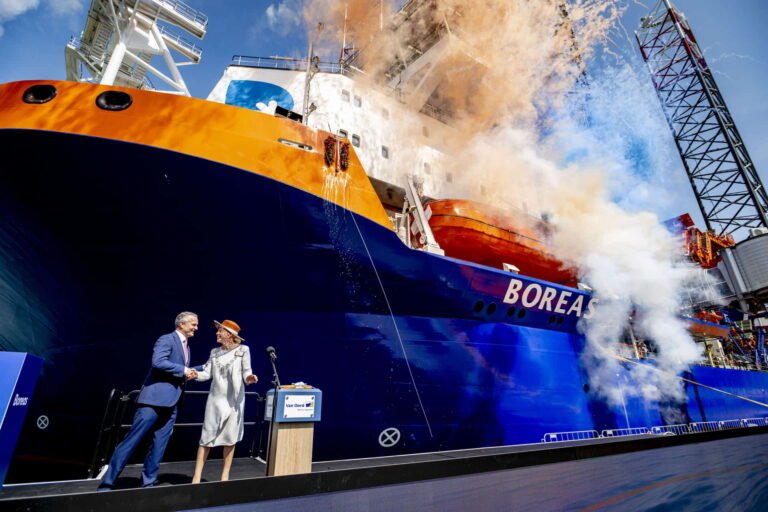Van Oord Christens World’s Largest Offshore Wind Installation Vessel, Boreas
Van Oord christened the latest addition to its fleet, Boreas, on June 18 in Rotterdam. The company describes its new jack-up vessel as the largest and most sustainable offshore wind installation vessel in the world, set to make its debut on the German Nordseecluster project.
The Dutch marine contractor ordered the self-elevating vessel at the Yantai CIMC Raffles shipyard in October 2021 and took delivery of the newbuild in January this year.
After the christening ceremony, Boreas will head to its first offshore wind project, the Nordseecluster in Germany, owned by RWE and Norges Bank Investment Management (NBIM).
Van Oord’s scope on Nordseecluster includes the installation of 104 monopiles for the wind turbines, as well as the foundation of the offshore substation and scour protection.
The 175-meter-long Boreas, named after the Greek god of the Northern winds, is purpose-built for the transport and installation of the next-generation foundations and wind turbines. The vessel has a crane with a 155-meter-high boom, able to lift over 3,000 tons, and can install offshore wind turbines of up to 20 MW with a total height of 300 meters.
The new jack-up vessel is equipped with dual-fuel methanol engines, reducing its carbon footprint by over 78%. It also features Selective Catalytic Reduction to minimize NOx emissions and a battery pack of more than 6,000 kWh to further reduce fuel consumption and emissions.
“The Boreas is the largest investment in our company’s history, a testament to our ambition to remain a frontrunner in offshore wind, accelerate the energy transition and perform our work responsibly. We have been leading our industry in the adoption of more sustainable green marine fuels even more with the capability to sail on methanol. The Boreas adds a new chapter to our net-zero emission journey”, said Govert van Oord, CEO of Van Oord.
Van Oord also shared that the company’s climate goals have been approved by the Science Based Targets initiative (SBTi), aligning with the 1.5°C pathway of the Paris Agreement. Van Oord submitted its greenhouse gas emissions reduction targets to the SBTi in May 2023, with all targets approved on June 1.

